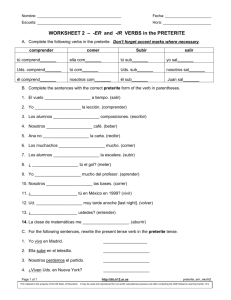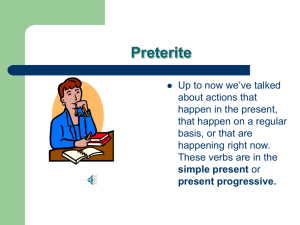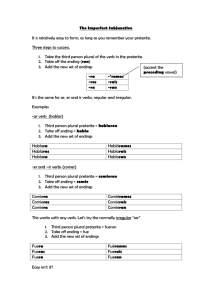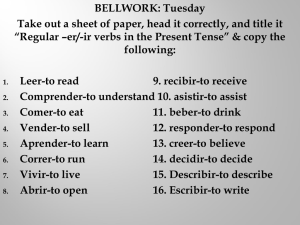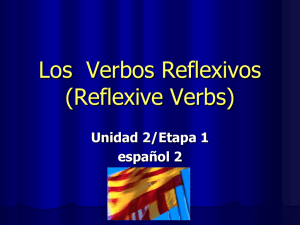El Pretérito- Verbos Regulares e Irregulares #1-6 Español 2
advertisement
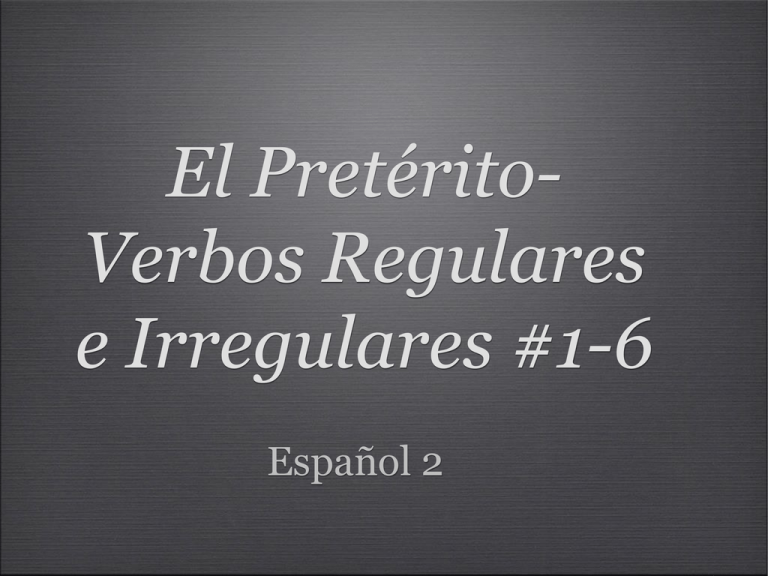
El PretéritoVerbos Regulares e Irregulares #1-6 Español 2 ¿Qué es el Pretérito? The preterite tense (El Pretérito) is used to express specific events or actions that were completed in the past. - Key words: -Ayer (yesterday) -Anoche (last night) -Anteayer (the day before yesterday) -La semana pasada (last week) -El mes pasado (last month) -El verano pasado (last summer) -Una vez (one time) -Hace una semana (one week ago) Preterite of Regular Verbs -To form the preterite tense of a regular verb: 1) drop the -AR/-ER/-IR ending 2) add the appropriate preterite ending to the stem of the verb -There are two sets of endings: -AR -é -aste -ó -ER/-IR -amos -aron -í -iste -ió hablar (talked) hablé hablamos -imos -ieron comer (ate) comí comimos hablaste hablasteis comiste comisteis habló comió hablaron comieron Note….. -AR and-ER verbs that have a stem change in the present tense do not EVER have a stem change in the preterite tense. *Only –ir verbs stem-change in the preterite. Ex. (probarse): Generalmente me pruebo (present) la ropa antes de comprarla, pero ayer no me probé (preterite) los pantalones que compré. Vamos a practicar..... Escribe cada verbo en el tiempo pretérito. 1. yo (hablar) hablé 2. tú (gastar) gastaste 3. él (escoger) escogió 4. ella (compartir) compartió 5. nosotros (arreglarse) nos arreglamos 6. Uds. (prepararse) se prepararon ¿Cuánto aprendiste del pretérito? Verbos -AR: miramos la televisión. (mirar) 1. Ayer, nosotros ________ ganaron el concurso anteayer? (ganar) 2. ¿Uds. ________ celebré mi fiesta. (celebrar) 3. El sábado pasado, yo _______ Escuchaste tú la radio esta mañana? (escuchar) 4. ¿________ estudié 5. Yo ________ mucho anoche. (estudiar) Verbs -ER /-IR: asistieron al concierto en julio. (asistir) 1. Sus primas _______ comió el sandwich conmigo. (comer) 2. Susana _______ vendí 3. Yo _______ mi coche porque es viejo. (vender) recibimos la ayuda esta tarde. (recibir) 4. Nosotros _______ Escribiste tú el informe la semana pasada? (escribir) 5. ¿_____ El pretéritoverbos irregulares Grupo #1: -CAR/-GAR/-ZAR Verbs that end in -car, -gar, and -zar have a spelling change in the *yo form (only) of the preterite due to pronunciation reasons. They have regular preterite -AR endings. buscar c qu yo busqué pagar g gu yo pagué c yo almorcé almorzar z Buscar (looked for) Otros Verbos: sacar investigar tocar apagar chocar llegar practicar jugar Pagar (paid) pagamos empezar comenzar cruzar tropezar Almorzar (ate for lunch) busqué buscamos pagué buscaste buscasteis pagaste pagasteis almorzaste almorzasteis buscó buscaron pagó almorzó pagaron almorcé almorzamos almorzaron El pretéritoVerbos Irregulares Grupo #2 ¡No Acentos! -The verbs Dar (to give) and Ver (to see/watch) have regular preterite -ER/-IR endings, but unlike those of the regular verbs, they have no written accent marks! Dar (gave) di dimos diste disteis dio dieron Ver (saw/watched) vi viste vio vimos visteis vieron Verbos irregularesGrupo #2 The verbs Ser (to be) and Ir (to go) have identical forms in the preterite tense. They can be Distinguished only according to their use in the sentence. Ser (was) Ir (went) fui fuimos fui fuiste fuisteis fuiste fuisteis fue fueron fue El año pasado fui animadora. fuimos fueron Ayer fuimos a la escuela. Verbos Irregulares-grupo #3 “U”/ “I”/ “J” -Irregular preterite stems require only one set of irregular endings. Apply -ar endings to yo and él, and -er/-ir endings to the rest (sideways “T”). Verb: Andar (went around/walked) -on bike/car Estar (was there) -- Stem: andUv Tener (had) tUv estUv -- Saber (*Found out) -- sUp Endings: -e -imos -iste -isteis -o -ieron ¡NO ACENTOS! Poder (able to) -- pUd Poner (put) -- pUs Querer (*tried to) -- quIs Estuve Estuvimos Venir (came) -- vIn Estuviste Estuvisteis Hacer (made/did) -- hIc Estuvo Estuvieron z ESTAR *hi -él/ella/Ud. Yo estuve en el centro por cinco horas. Vamos a aprender una canción Tener es tuve estar estuve ir es fui también ser poner es puse poder es pude traje es para traer hacer; hice haber; hube saber; supe querer; quise decir; dije venir; vine ver; vi dar; di No acentos VIDEO: CANCIÓN “Verbos Irregulares” If link doesn’t work: song goes to “la cucaracha” Verbos Irregulares-Grupo #3 “U”/ “I”/ “J” Decir (said/told) -- diJ Traer (brought) -- traJ Conducir (drove) -- conduJ Traducir (translated) -DECIR diJe diJiste diJo diJimos diJisteis diJeron traduJ ¡NO ACENTOS! -e -imos -iste -isteis -o *-eron La cucaracha song with irregular verbs: http://www.youtube.com/watch?v=iFUAWMMdE7c&feature=relmfu Vamos a practicar... Escribe la forma correcta de cada verbo en el tiempo pretérito. 1. Yo (tener) 2. Pedro (estar) 3. Los chicos (andar) 4. Nosotros (poner) 5. Tú (saber) 6. Ellos (poder) 7. He tried. (querer) 8. We did the homework. 9. They came late. 10. I had a lot of homework. Verbos irregularesGrupo #4 “I=Y” In this group, the “i” changes to “y” in the él/ella/Ud. & ellos/ellas/Uds. forms. (p.250) There is an accent mark in every form but ellos/ellas/Uds. oír (heard) leer (read) creer (believed/thought) oí oímos leí leímos creí creímos oíste oísteis leíste leísteis creíste creísteis oYó oYeron leYó leYeron creYó creYeron * destruir (destroyed) destruí *destruimos *destruiste destruisteis destruYó destruYeron caerse (fell) me caí nos caímos te caíste os caísteis se caYó se caYeron Vamos a practicar Escribe el verbo en el pretérito que mejor completa las oraciones. 1. Ayer tú ______ (oír/leer) el noticiero en la radio. 2. Mis padres ______ (creer/destruir) el reportero. 3. El hurácan ______ (oír/destruir) las casas. 4. Los bomberos ______ (leer/oír) la explosión. 5. El incendio ______ (destruir/leer) los muebles. 6. Nosotros ______ (oír/leer) los artículos del periódico. 7. Los estudiantes no ______ (destruir/creer) que no hubo tarea anoche. 8. ¿______ (Oír/leer) Uds. a la chica gritar “Socorro”? Remember: Verbos Irregulares-grupo #3 “U”/ “I”/ “J” -Irregular preterite stems require only one set of irregular endings. Apply -ar endings to yo and él, and -er/-ir endings to the rest (sideways “T”). -Go back to Group #3 and add the “J” group. Verb: Andar (went around/walked on bike/car) Estar (was there) -- Stem: andUv Tener (had) -- tUv Saber (*found out) -- sUp Poder (able to) -- pUd ¡NO ACENTOS! Poner (put) -- pUs DECIR Querer (*tried to) -- quIs Dije Dijimos Venir (came) -- vIn Dijiste Dijisteis Hacer (made/did) -- hIc Dijo *Dijeron Decir (said/told) -- diJ Traer (brought) -- traJ Conducir (drove) -- conduJ Traducir (translated) -- traduJ estUv Endings: -e -imos -iste -isteis -o -ieron Yo dije la verdad. *After the “j”, drop the “i”. Vamos a practicar Escribe el verbo en el pretérito que mejor completa las oraciones. 1. Ayer tú ______ (traer/decir) que no fuiste a la fiesta. 2. Mis padres ______ (conducir/traducir) el reporte. 3. El huracán ______ (traer/conducir) mucha destrucción. 4. Los bomberos ______ (traer/conducir) el camión de bomberos. 5. Nosotros______ (traer/decir) los muebles a la camioneta. 6. La reportera ____ (conducir/traducir) los artículos del periódico. 7. Los estudiantes no ______ (conducir/traducir) bien el informe. 8. ¿______ (conducir/traducir) tú el coche por diez horas? Verbos irregularesGrupo #5 “E-I”, “O-U” “Sandal” verbs= -ir stem-changing verbs in the preterite (p. 302): Stem-change in the 3rd person forms only (“sandal”) 2 Stem-Changes: e i ; o u Pedir (e i) (asked) Dormir (o u) (slept) pedí pedimos dormí dormimos pediste pedisteis dormiste dormisteis pidió pidieron durmió durmieron Other sandal verbs: Sentirse (feel) Preferir (prefer) Servir (serve) Seguir (follow/continue) Mentir (lie) Conseguir (get) Divertirse (have fun) Vestirse (dress/dress oneself) Despedirse (say good-bye) Morir (die), Competir Vamos a practicar Escribe el verbo en el pretérito que mejor completa las oraciones. 1. Ayer tú ______ (conseguir) el noticiero. 2. Mis padres ______ (pedir) el reporte. 3. El hurácan ______ (seguir) por varias horas. 4. Los bomberos ______ (despedirse) de la gente. 5. El herido ______ (morir) en el hospital. 6. Nosotros ______ (divertirse) en la asambléa el viernes pasado. 7. Los estudiantes no ______ (mentir) a la maestra. 8. Ella ______ (sentirse) mal la semana pasada. 9. Los camareros ________ (servir) muy bien la comida. 10. _________ (Vestirse) de prisa porque nos despertamos tarde. 11. Yo _______ (seguir) derecho y después doblé a la izquierda. 12. El policía ______ (preferir) investigar el incendio ahora.
